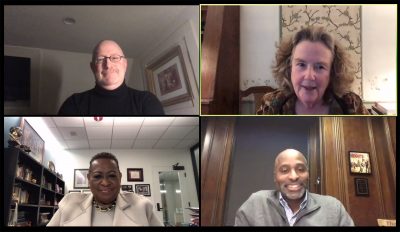
The final Student-Faculty Forum of 2020, hosted by the Howard Thurman Center Thursday evening, focused on regeneration and healing from the effects of systemic racism.
Dean Emerita of Arts & Sciences Virginia Sapiro moderated the Zoom discussion, which included speeches from panelists who answered select questions from viewers.
For each forum, Sapiro said she choses panelists with diversity in mind, selecting academics with different backgrounds to provide interesting dialogue.
“I pick people who really have very good expertise in very different disciplines,” Sapiro said in an interview. “Then we meet in a fresh way with each of us giving our reflections.”
More than 45 members of the Boston University community, including students and faculty members, attended the virtual forum. Typically, the forums are meant to spark conversation among students and think critically and actively about important issues, Sapiro said.
Each expert spoke for about seven minutes to discuss their experiences and research on the current domestic issues surrounding ethnocentrism and racism.
HTC Director Katherine Kennedy spoke on her time as a Boston Globe reporter covering the school desegregation crisis. During the talk, she said she rode on a school bus with other Black students while parents who opposed desegregation threw stones and spewed slurs at the bus.
“I realized I had a responsibility beyond myself,” Kennedy said, “both as a journalist and as a Black person.”
Kennedy described how racism is often perceived as an abstract idea instead of the concrete reality people experience.
“We often treat racism and ethnocentrism as something that is studied and mentioned only in academia,” Kennedy said, “as opposed to something that we experience in various ways every day.”
Timothy Longman, a professor of international relations and political science, said he believes a majority of the population opposes racism and prejudice but just does not want to confront it.
“We lack the willingness,” Longman said, “to deal with the deep inequalities that are rooted in a history of slavery and of Jim Crow and of redlining and of all the other structural issues that have divided our society along racial lines.”
College of Fine Arts Dean Harvey Young ended the panelists’ presentation session with an emphasis on the current social climate, and lauded the BU community for its activism.
“Here at BU, students and staff, faculty and alumni, have gathered virtually even in the midst of a pandemic, to call attention to the importance of dismantling structures that enable racism, gender bias and other forms of prejudice,” Young said. “I hope it reaffirms everyone’s appreciation for the types of conversations, but also the type of proactively positive work that occurs here at BU.”
Attendee Demetri Kling, a freshman in the College of Arts and Sciences, said the event taught him the importance of finding common ground with others, and would recommend students attend future HTC forums and events.
“I thought it was a very important thing, to become aware from different perspectives of how the nation will heal from a lot of the racism that people have faced,” Kling said.
The HTC started conducting student-faculty forums in 2016, Sapiro said, which usually run on a monthly basis. She reiterated the importance of the forums as a space for discussion between students and faculty to promote action.
“It’s a bringing together of our expertise and knowledge with an effort that helps all of us think more deeply,” Sapiro said, “and figure out what difference we want to make in the world and how we might achieve that.”























































































































Megan • Dec 4, 2020 at 10:46 pm
I love this article
Minh • Dec 4, 2020 at 10:15 pm
Thank you for the great read!
Zhao • Dec 4, 2020 at 10:14 pm
Thank you Isabella for reporting this important issue!